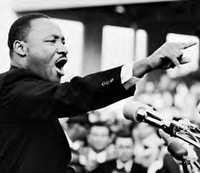 While many of the more spectacular 20th century crimes make great movies and make exciting headlines and stories, not all acts done by criminals have any social importance. But the killing of Martin Luther King is far more than just a senseless gunning down of a Baptist minister. It is safe to say that along with the assignation of John F. Kennedy and perhaps a few other incidents, King’s murder may be one of the most influential events of the century.
While many of the more spectacular 20th century crimes make great movies and make exciting headlines and stories, not all acts done by criminals have any social importance. But the killing of Martin Luther King is far more than just a senseless gunning down of a Baptist minister. It is safe to say that along with the assignation of John F. Kennedy and perhaps a few other incidents, King’s murder may be one of the most influential events of the century.
It is impossible to understand how or why the killing of Dr. King happened without putting it in context. Of course, the position of leadership Martin Luther King took in the civil rights movement is well known. Beginning with the Montgomery Bus Boycott, Dr. King took on greater and greater degrees of leadership in the rapidly expanding movement for equal rights for African Americans. It is worth noting that Martin Luther King was a devout follower of Gandhi’s concepts of nonviolent means to achieve social change.
But despite King’s teachings and desire to see the goals of the civil rights movement achieved nonviolently, the movement itself became more and more violent each year. King and other leaders of the movement were doing all they could to hold back the violence but decades of pent of rage resulted in riots and other acts of violence throughout the country. This made every civil rights event Dr. King attended a potential powder keg that could blow up into a violent demonstration and even overwhelm the leadership of Dr. King himself.
The event that resulting the tragic death of the great leader started with a strike of the sanitation workers in Memphis, Tennessee. After stopping in Memphis on March 18, 1968, he returned to lead a march in support of the strike ten days later. King always taught his followers passive resistance and nonviolence but like so many civil rights events, this march turned violent eventually leading to rock and bottle throwing and looting.
Discouraged and troubled by the violence, Dr. King returned to Memphis on April 3 to deliver a speech and try to preserve the energy of the movement there but discourage its violent elements. He gave one of his historic speeches often referred to as the “I’ve been to the mountaintop” speech. That night he retired to a humble motel to rest, the Lorraine Motel in downtown Memphis. On the evening of April 4, 1968, as Dr. King was preparing for dinner with Billy Kyles, a Memphis minister, Dr. King stepped out onto the balcony of room 306.
That is when history changed at the hands of an assassin. Friends nearby heard the single shot of a .30-06 caliber rifle ring out. The bullet entered Dr. King at the jaw, went through his neck, which cut his spinal cord and lodged in his shoulder. Ralph Abernathy and other close associates did all they could as Dr. King lay dying on the balcony floor but even after surgery that night, Martin Luther King died at 7:05 on April 4, 1968.
The impact of this great man continues to impact society to this day. Despite his tragic death, his hopes and dreams for equality for all people continued to move forward. While racism still is a force in America, we now see African Americans succeeding at all levels of leadership and even at the highest office of the land, the presidency. The anniversary of Dr. King’s death is an inspiration to us all to keep striving to see that dream that he had become a reality.
